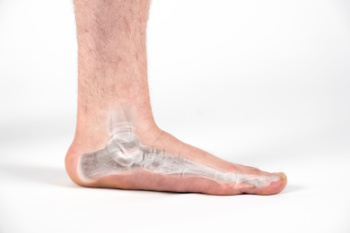
Flat feet, also known as fallen arches, occur when the arches of the feet are lower than usual or completely flat, causing the entire sole of the foot to touch the ground when standing. While many people with flat feet experience no symptoms, others may develop pain, particularly in the feet, ankles, or lower legs. This condition can lead to overpronation, where the foot rolls inward excessively during walking or running, potentially causing alignment issues and stress on the knees and hips. If flat feet develop suddenly in adulthood, it may indicate an underlying issue such as a tendon injury or arthritis. If you have persistent pain and difficulty engaging in activities because of flat feet, it is suggested that you schedule an appointment with a podiatrist who can assess the severity, recommend treatments like orthotics, and guide you on managing symptoms to prevent complications and improve foot function.
Flatfoot is a condition many people suffer from. If you have flat feet, contact Priyanka Mude, DPM from North Canton Podiatry. Our doctor will treat your foot and ankle needs.
What Are Flat Feet?
Flatfoot is a condition in which the arch of the foot is depressed and the sole of the foot is almost completely in contact with the ground. About 20-30% of the population generally has flat feet because their arches never formed during growth.
Conditions & Problems:
Having flat feet makes it difficult to run or walk because of the stress placed on the ankles.
Alignment – The general alignment of your legs can be disrupted, because the ankles move inward which can cause major discomfort.
Knees – If you have complications with your knees, flat feet can be a contributor to arthritis in that area.
Symptoms
- Pain around the heel or arch area
- Trouble standing on the tip toe
- Swelling around the inside of the ankle
- Flat look to one or both feet
- Having your shoes feel uneven when worn
Treatment
If you are experiencing pain and stress on the foot you may weaken the posterior tibial tendon, which runs around the inside of the ankle.
If you have any questions please feel free to contact our office located in North Canton, Ohio . We offer the newest diagnostic and treatment technologies for all your foot and ankle needs.
